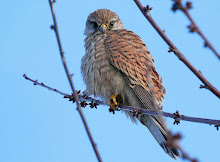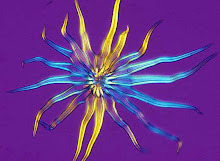Thursday's Guardian Country Diary is about this November-flowering dog rose that we found blooming amongst the rose hips, on a bush growing at Hawthorn Dene on the Durham coast.
The recent record-breaking spell of warm late-autumn weather has extended the flowering period of many plants and even induced some to flower for a second time. Recently we've found holly in bloom and also elder flowers opening alongside berries on the same branch, as well as the usual late-blooming suspects like yarrow, hogweed and clovers.
This rose was one of two fully-open flowers on a bush covered with ripe rose hips on leafless stems. None of the other roses around it had any flowers. Presumably this individual plant was genetically predisposed to reacting to warmer-than-normal November temperatures. I've seen burnet rose flowering at Christmas in a couple of mild winters but have never seen this kind of behaviour in dog roses.
It seems unlikely that these late flowers will produce seeds because there were no bee pollinators around and the plant had almost no leaves to provide sugars to fill seeds, unlike ...
... the late-flowering yellow-wort that was blooming at the same site. These flowers were being visited by small fly pollinators that are quite numerous at this time of year and especially attracted to yellow flowers. This species is a fast-growing annual and I suspect that the late-bloomers that we saw might have been second-generation plants themselves, benefitting from the unusually long growing season this year.
Like many annuals, yellow-wort is one of those plants that can grow large and carry scores of flowers in good soil conditions but can also survive in tiny pockets of soil, producing very small plants with just a few flowers and setting seed rapidly when conditions are challenging. Thanks to those fly visitors, the tiny plants flowering in limestone fissures that we found might well produce some viable seeds before winter finally bites.
Subscribe to:
Post Comments (Atom)

























Everything has died back up here with the exception of grass which is still growing. It is even growing back through the barley stubble which considering that they spray to kill it before harvesting is amazing. Sheep are grazing on the fields. Snow is forecast for the weekend so that will put a stop to things.
ReplyDeleteI have Evening Primroses in bloom again. That surprised me.
ReplyDelete